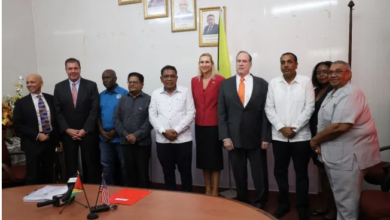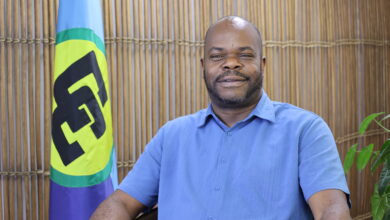(CARICOM Secretariat, Turkeyen, Greater Georgetown, Guyana) Young people in the Caribbean Community (CARICOM) are interested and involved in the agriculture sector, but need, land, finance, mentorship, and greater involvement in policy-making.
This emerged as the consensus among youth across the Region on Monday as they began three days of interaction under the umbrella of the Caribbean Week of Agriculture (CWA) in Antigua and Barbuda.
The CWA, which began on 12 October and concludes on 20 October, is of significant importance to young people this year, given its theme `Celebrating Youth and Gender in Caribbean agriculture – Each Endeavouring, All Achieving’.
Representing 14 Member States, the youths gathered at the Grand Royal Antiguan Beach Resort for a workshop on Youth and Rural Modernisation, and were firm on their interest in the field but insisted that an integrated support package was imperative if the sector were to become more attractive.
They pointed out that more often than not, youths interested in agriculture had access to land but no finance, or vice versa, and were not benefitting from business and technical support and mentorship in wealth creation. They also yearned for information on successful agricultural ventures undertaken by youths in order to further encourage them to embrace the sector.
Youth representatives stressed also that the long-term viability of the sector must be visible to pique and hold their interest.
Ms. Kimberly Gay of the Trinidad and Tobago Ministry of Food Production was of the view that agriculture needed to be rebranded so that youths could consider it as a business with value added and not simply in terms of primary production. She also stressed the importance of using of Information Communication Technologies to target young people.
For some of the youths, the traditional image of regional agriculture versus the more cerebral and technologically savvy approach of the young people interested in agri-business, were sources of “constant conflict” with which they had to contend.
“The outlook of a farmer is not one that would attract youth to the sector…You can’t get a person with a Bachelor’s Degree to go into a farm; he would prefer to sit in an office and tell somebody who did not go to school, how exactly to do agriculture and then you have that conflict of ideology …”, said Mr. Kurt Harris of Saint Lucia, stressing the need for a change of culture of the sector and an effective succession plan.
A colleague who is interested in farming and is also pursuing a Master’s Degree agreed with him. The student said he was more interested in aqua-culture and greenhouses than in traditional farming and called for an enabling environment for enterprise development.
Addressing the subject of the traditional image of the farmer and agriculture, a veteran farmer at the forum warned, however, that “you will not get out of the rough and tumble of agriculture”.
“…it is the nature of agriculture. You are not going to run a big farm and look like a lawyer … it is a different discipline…If you want to look like Lawyer John, or Dr. John, or Teacher Mary, go into those disciplines; they are as good as agriculture. Nothing is wrong with the image of agriculture…
“What we must do now is tackle the largest bill in the Caribbean, which is the food import bill. Let us get our people to eat our local starch – yams, cocoa and bananas. Let us tell our children that nothing is wrong with it. That is the image problem we face. In transcending that image, we are telling them that an imported starch, rice and flour that we don’t produce here is better than (what we produce). That is the image problem I am a farmer and I love the image of a farmer, Mr. Leonard Copeland of Jamaica told the youth.





